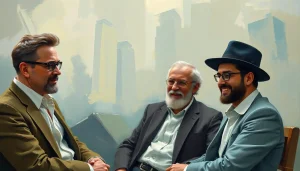From ancient marketplaces to Silicon Valley boardrooms, the story of Jewish entrepreneurship weaves a tapestry of innovation, resilience, and cultural values that have shaped global business for centuries. This rich history of Jewish business acumen has not only transformed industries but also left an indelible mark on the world economy. As we delve into the fascinating world of Jewish entrepreneurship, we’ll uncover the unique characteristics that have propelled countless individuals to success and explore the enduring impact of their contributions.
The Jewish entrepreneur is often defined by a set of distinctive traits and values deeply rooted in cultural traditions. These characteristics have been honed over generations, forged in the crucible of adversity and tempered by an unwavering commitment to progress. At the heart of this entrepreneurial spirit lies a profound respect for education, a strong sense of community, and an unyielding drive to make the world a better place.
The Cultural Foundations of Jewish Entrepreneurship: A Recipe for Success
Education has always been the cornerstone of Jewish culture, and this emphasis on learning has played a pivotal role in shaping the Jewish entrepreneurial mindset. From an early age, Jewish children are taught the value of knowledge and critical thinking. This lifelong pursuit of wisdom extends far beyond the classroom, fostering a culture of curiosity and innovation that serves entrepreneurs well in the fast-paced world of business.
But it’s not just about individual achievement. The strong emphasis on family and community in Jewish culture creates a powerful support network for budding entrepreneurs. This sense of collective responsibility and mutual aid has given rise to thriving business ecosystems where knowledge, resources, and opportunities are shared freely. It’s a testament to the power of community in fostering entrepreneurship and family business: navigating success across generations.
At the heart of Jewish entrepreneurship lies the concept of “tikkun olam” – the duty to repair the world. This principle drives many Jewish business leaders to look beyond profit margins and consider the broader impact of their ventures. It’s a philosophy that aligns perfectly with the modern trend of social entrepreneurship, where business acumen is leveraged to address pressing global challenges.
Risk-taking and resilience are also deeply ingrained in Jewish culture, shaped by centuries of adversity and displacement. This ability to adapt and thrive in the face of uncertainty has equipped Jewish entrepreneurs with the mental fortitude needed to navigate the often turbulent waters of the business world.
The Secret Sauce: Key Traits of Successful Jewish Entrepreneurs
So, what sets successful Jewish entrepreneurs apart? It’s a potent mix of innovation, adaptability, and an uncanny ability to spot opportunities where others see obstacles. Take, for example, the story of Estée Lauder, who transformed her uncle’s face cream recipes into a global beauty empire. Her success wasn’t just about having a great product – it was her innovative approach to marketing and her ability to adapt to changing consumer preferences that set her apart.
Networking and relationship-building are also crucial skills in the Jewish entrepreneur’s toolkit. The ability to forge strong connections and build trust has helped many Jewish business leaders create powerful alliances and open doors to new opportunities. It’s a skill that’s particularly valuable in today’s interconnected global economy.
Financial acumen and resource management are other hallmarks of successful Jewish entrepreneurs. This isn’t just about being good with numbers – it’s about understanding the value of every resource, whether it’s capital, talent, or time. It’s an approach that has its roots in centuries of operating businesses under challenging circumstances, where every penny and every minute counted.
But perhaps the most defining characteristic of Jewish entrepreneurs is their unparalleled work ethic and perseverance. It’s the drive that pushes them to keep going when others might give up, to see setbacks as opportunities for growth rather than insurmountable obstacles. This relentless pursuit of success is deeply rooted in Jewish cultural values and has been a key factor in the remarkable achievements of Jewish entrepreneurs throughout history.
Trailblazers and Titans: Notable Jewish Entrepreneurs Throughout History
The annals of business history are replete with examples of Jewish entrepreneurs who have left an indelible mark on their industries. From retail pioneers like Isidor Straus of Macy’s fame to media moguls like Sumner Redstone, Jewish entrepreneurs have been at the forefront of innovation and industry transformation.
Take, for instance, the story of Levi Strauss. A Bavarian-born Jewish immigrant, Strauss arrived in San Francisco during the Gold Rush era. Instead of panning for gold, he saw an opportunity in providing durable clothing for miners. His innovation – riveted denim jeans – not only built a global fashion empire but also became an enduring symbol of American culture.
Or consider the impact of Michael Dell on the personal computer industry. Starting from his college dorm room, Dell revolutionized the PC market with his direct-to-consumer model, challenging industry giants and reshaping how technology is sold and distributed.
These success stories are not just about individual achievements. Many Jewish entrepreneurs have used their wealth and influence to make significant philanthropic contributions. The Rothschild family, for instance, has a long history of supporting arts, sciences, and social causes. More recently, tech entrepreneurs like Mark Zuckerberg have pledged billions to causes ranging from education to healthcare.
What’s particularly inspiring about these success stories is that many of these entrepreneurs achieved greatness in the face of significant adversity and discrimination. The resilience and determination they showed in overcoming these challenges are a testament to the enduring spirit of Jewish entrepreneurship.
Silicon Wadi and Beyond: Modern Jewish Entrepreneurship in the Digital Age
As we move into the digital age, Jewish entrepreneurs continue to be at the forefront of innovation, particularly in the tech sector. Israel, often referred to as the “Start-up Nation,” has become a global hub for tech innovation, rivaling Silicon Valley in its entrepreneurial spirit and output. This phenomenon of Israel entrepreneurship: a thriving ecosystem of innovation and success is a fascinating example of how cultural values can drive economic growth and technological advancement.
From cybersecurity to artificial intelligence, Israeli startups are making waves across various tech sectors. Companies like Waze (acquired by Google) and Mobileye (acquired by Intel) have not only achieved tremendous success but have also paved the way for a new generation of Jewish tech entrepreneurs.
But it’s not just about tech. Many Jewish entrepreneurs are at the forefront of social entrepreneurship and impact investing, using business principles to address pressing social and environmental issues. This approach aligns perfectly with the Jewish principle of tikkun olam, demonstrating how traditional values can be applied to modern business challenges.
The challenge for many modern Jewish entrepreneurs lies in balancing tradition with technological advancement. How do you maintain cultural identity and values in a rapidly changing, globalized market? It’s a question that many are grappling with, finding innovative ways to integrate Jewish ethics and practices into cutting-edge business models.
Navigating Choppy Waters: Challenges and Opportunities for Jewish Entrepreneurs Today
Despite the many success stories, Jewish entrepreneurs today face a unique set of challenges. Antisemitism, unfortunately, remains a reality in many parts of the world, including the business sphere. Navigating these prejudices while building successful enterprises requires resilience, strategy, and often, a thick skin.
Maintaining cultural identity in an increasingly globalized market presents another challenge. As businesses expand across borders and cultures, there’s often pressure to conform to a more homogenized corporate culture. For Jewish entrepreneurs, the challenge lies in staying true to their cultural roots while embracing global business practices.
However, these challenges also present opportunities. The global Jewish diaspora has created a vast network of connections spanning continents and industries. Savvy entrepreneurs can leverage these networks to access resources, mentorship, and business opportunities. Organizations like the Jewish Federations of North America and the American Jewish Committee provide platforms for networking and support, helping to nurture the next generation of Jewish business leaders.
Mentorship plays a crucial role in this ecosystem. Established Jewish entrepreneurs often take it upon themselves to guide and support up-and-coming talent, passing on not just business acumen but also the cultural values that have underpinned Jewish entrepreneurial success for generations.
Lessons from the Chosen People: What All Entrepreneurs Can Learn
The story of Jewish entrepreneurship offers valuable lessons for business leaders of all backgrounds. The emphasis on education and lifelong learning, for instance, is a principle that can benefit any entrepreneur in our rapidly changing business landscape. Similarly, the focus on community and mutual support demonstrates the power of networks in fostering innovation and growth.
The Jewish approach to risk and resilience is another valuable lesson. In a world where disruption is the norm, the ability to adapt and thrive in the face of uncertainty is more crucial than ever. As Gen Z entrepreneurship: revolutionizing business in the digital age takes center stage, these timeless principles find new relevance and application.
The principle of tikkun olam – using business as a force for good – resonates strongly with modern concepts of corporate social responsibility and sustainable business practices. It’s a reminder that profit and purpose need not be mutually exclusive, and that the most enduring businesses are often those that create value for society as a whole.
The Future is Bright: Prospects for Jewish Entrepreneurs
As we look to the future, the prospects for Jewish entrepreneurs appear bright. The combination of cultural values, global networks, and a track record of innovation positions Jewish business leaders well to tackle the challenges and opportunities of the 21st century.
From cultural entrepreneurship: innovating at the intersection of creativity and business to pioneering new frontiers in technology and social impact, Jewish entrepreneurs are likely to continue playing a significant role in shaping the global business landscape.
The story of Jewish entrepreneurship is far from over. It’s a living, breathing narrative that continues to evolve, adapting to new challenges while staying true to its core values. As we’ve seen, it’s a story rich with lessons for entrepreneurs of all backgrounds – a testament to the power of culture, community, and unwavering determination in achieving business success.
So, whether you’re a budding entrepreneur looking for inspiration or an established business leader seeking fresh perspectives, the Jewish entrepreneurial tradition offers a wealth of wisdom. It reminds us that true success in business is not just about profits, but about creating value, fostering innovation, and leaving the world a little better than we found it.
As we wrap up this exploration of Jewish entrepreneurship, it’s clear that its impact extends far beyond the Jewish community. It’s a story of human ingenuity, resilience, and the power of cultural values in shaping business success. And in today’s rapidly changing business landscape, these timeless principles are more relevant than ever.
From the bustling markets of ancient Jerusalem to the gleaming tech hubs of Tel Aviv and Silicon Valley, the spirit of Jewish entrepreneurship continues to thrive, innovate, and inspire. It’s a legacy that has stood the test of time, and one that promises to shape the future of global business for generations to come.
References:
1. Abrams, R. (2014). “The Torah of Management: Ancient Wisdom for Modern Business.” Business Expert Press.
2. Senor, D., & Singer, S. (2011). “Start-up Nation: The Story of Israel’s Economic Miracle.” Twelve.
3. Muller, J. Z. (2010). “Capitalism and the Jews.” Princeton University Press.
4. Karp, J. (2008). “The Politics of Jewish Commerce: Economic Thought and Emancipation in Europe, 1638-1848.” Cambridge University Press.
5. Supple, B. (1957). “A Business Elite: German-Jewish Financiers in Nineteenth-Century New York.” Business History Review, 31(2), 143-178.
6. Chiswick, B. R. (1999). “The Occupational Attainment and Earnings of American Jewry, 1890-1990.” Contemporary Jewry, 20(1), 68-98.
7. Botticini, M., & Eckstein, Z. (2012). “The Chosen Few: How Education Shaped Jewish History, 70-1492.” Princeton University Press.
8. Weinberg, R. (2010). “The Revolution of 1905 in Odessa: Blood on the Steps.” Indiana University Press.
9. Gartner, L. P. (2001). “History of the Jews in Modern Times.” Oxford University Press.
10. Sachar, H. M. (2005). “A History of the Jews in the Modern World.” Vintage Books.












Would you like to add any comments? (optional)